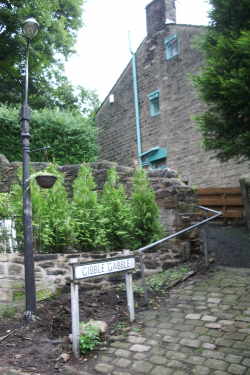A brand new coinage from Chris Warren
Today’s offering from Word of the Day is a present from my esteemed friend and learned colleague Chris Warren – a brand new coinage, no less. We therefore break our usual custom and provide guidance on its meaning and usage, as you will not find this word in dictionaries – yet:
livingstone
First, please notice the lack of an initial capital letter. This is not the Livingstone daisy, nor does it refer to the Scottish missionary and explorer of Africa – though it does derive from the latter. A livingstone is a missing file, originally a word processor file or ‘lost doc’ (as in: “I’m suffering from a livingstone since that hard disc crash”). It is possible to predict that this will lead to the finding of the same becoming known as a stanley (‘Ah! I’ve found the lost doc! “Dr Livingstone, I presume?”‘).
Readers of a linguistic bent (aren’t we all bent a little that way?) will recognise that this word is in the class that includes three which featured in Word of the Day earlier this month: hoover, dewar and newton. These are names which have lost their initial capital letters. It seems, according to Wikipedia, that these are capitonyms: ‘A capitonym is a word that changes its meaning (and sometimes pronunciation) when it is capitalized.’
After this lengthy and (we hope you’ll agree) special Word of the Day, the service will be taking a whole week’s rest whilst we roam. Or, to capitalise it: Rome. If you’d like to receive a copy of the (more or less) daily email, please visit the Word of the Day page.

 A writer to
A writer to  Yes, there really is a place called Gibble Gabble. More accurately, it’s a street – or, more accurately still, a ginnel. Collins Dictionary defines this as ‘Northern English dialect’ (but you knew that, didn’t you?): ‘a narrow passageway between buildings’.
Yes, there really is a place called Gibble Gabble. More accurately, it’s a street – or, more accurately still, a ginnel. Collins Dictionary defines this as ‘Northern English dialect’ (but you knew that, didn’t you?): ‘a narrow passageway between buildings’.  Which is pretty well what Gibble Gabble is – a twisting cobbled path running up a steep slope in the old mill village of Broadbottom. But how did it acquire its delightful name (Gibble Gabble, that is, not Broadbottom)? From the noise made by millworkers streaming down the hill to Sidebottom’s mill, the clattering of their clogs drowned by their loud Lancashire laughs? Happen, lass, that’s how it were….
Which is pretty well what Gibble Gabble is – a twisting cobbled path running up a steep slope in the old mill village of Broadbottom. But how did it acquire its delightful name (Gibble Gabble, that is, not Broadbottom)? From the noise made by millworkers streaming down the hill to Sidebottom’s mill, the clattering of their clogs drowned by their loud Lancashire laughs? Happen, lass, that’s how it were….